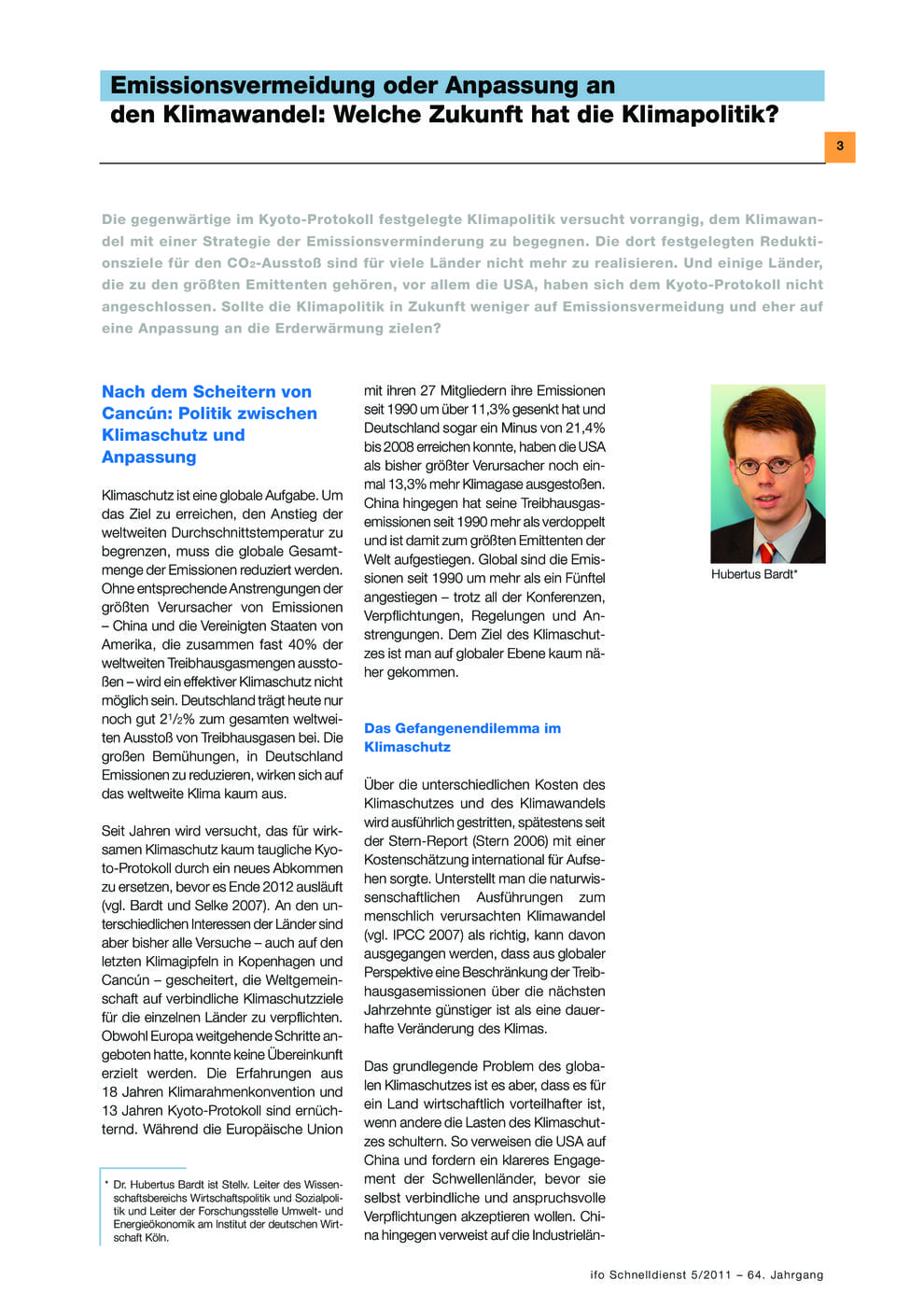Emissions avoidance or adaptation to climate change: What is the future of climate policy?
ifo Institut für Wirtschaftsforschung, München, 2011
ifo Schnelldienst, 2011, 64, Nr. 05, 03-29

Current climate policy set down in the Kyoto Protocol seeks primarily to confront climate change with a strategy of emissions reduction. Should future climate policy concentrate less on emissions avoidance and more on adaptation to the warming of the earth? Hubertus Bardt, Cologne Institute of the German Economy, fears that despite the pioneering role of Germany and Europe, a stabilisation of the climate as a global public good will not be sufficiently achieved. For this reason it is important to establish a balanced policy mix of climate protection and adaptation to climate change. Neither a pure adaptation to avoidable climate modifications nor an avoidance of climate-damaging gas emissions at all costs are reasonable strategies. Lars P. Field, University of Freiburg and Walter Eucken Institute, Kai A. Konrad, Max Planck Institute for Tax Law and Public Finance, Munich, and Marcel Thum, Technical University of Dresden and Ifo Dresden, doubt that the strategy of German and European climate policy, which is characterised by considerable concessions, is the correct alternative. It is not clear whether one-sided concessions on the part of Germany or Europe can offer a constructive contribution to the slowing of global warming. Instead of an extremely one-sided avoidance policy, more efforts towards an adaptation strategy are needed. Wolfgang Buchholz, University of Regensburg, and Dirk Rübbelke, Basque Centre for Climate Change, are also fairly sceptical with regard to the chances of success of a global avoidance strategy of greenhouse gases but also have grounds to assume that the avoidance efforts will be stepped up globally. What is important is achieving a balance between obligations and flexibility, the latter being indispensable due to the great insecurities of the benefits and costs of climate change. Christian Hey, Karin Holm-Müller and Michael Weber of the Council of Experts on Environmental Issues warn against either/or decisions and point out at that according to the Scientific Advisory Board of the German federal government without sufficient counter measures climate change will soon overtax the adaptability of many societies. In addition national self-obligations, even in the absence of a global climate protection regime, could lie in countries' own interests, especially since they often go along with other efficiency effects. This, in their opinion, underscores the importance of a national avoidance strategy. For Rüdiger Pethig, University of Siegen, the best policy approach is a combination of adaptation and avoidance on a national and international level. In the opinion of Joachim Weimann, University of Magdeburg, previous experience indicates that a global climate agreement is not likely to be reached. This clearly reduces the chances of success of an avoidance policy, because climate policy can only be successful if it is practised on a global scale. Adaptation measures require less government intervention by far. With the insight that an avoidance strategy is doomed to fail, the signal should be given for a partial withdrawal of the state. Timo Goeschl, University of Heidelberg, argues that the current discussion on avoidance versus adaptation is too short sighted since concrete ideas are already evident that point to a new combination of the two alternatives and are suitable for a "deliberate, large-scale manipulation of the climate system by means of technology. These methods of geo-engineering are akin to mitigation in terms of their global effectiveness and to adaptation in terms of rapid effectiveness."
Included in
ifo Schnelldienst 5/2011
in: ifo Schnelldienst, 2011, 64, Nr. 05